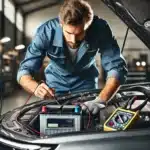When it comes to batteries, not all are created equal. If you’re wondering whether a deep cycle or car battery is the right choice for your needs, you’re in the right place. Today, I’ll guide you through the key differences between these two types of batteries, making it easier for you to make the right choice.
Table of contents
Key Differences Between Deep Cycle and Car Batteries
Alright, now let’s break down the key differences between deep-cycle batteries and car batteries.
What is a Deep Cycle Battery?
Let’s start by understanding what deep-cycle batteries are. These batteries are designed to provide steady power over a long period. Think of them as marathon runners—they’re in it for the long haul. They are commonly used in things like RVs, solar energy systems, and marine equipment. Unlike car batteries, deep-cycle batteries are built to be deeply discharged (used until almost all the energy is gone) before they are recharged.
Read about Signs Your Deep Cycle Battery Needs Replacement.
In a deep cycle battery, the focus is on long-term power supply. These batteries are ideal for devices or systems that need a reliable power source over extended periods. They have thick plates inside, which makes them more robust, durable, and suited for repetitive charging and discharging. But we’ll get into more of that later.
What is a Car Battery?
Now, let’s talk about car batteries. These batteries are more like sprinters—they provide a short burst of energy to start your car. After that, the alternator takes over, powering the car’s electronics and charging the battery.
Car batteries are designed to provide high power for a very short time, which makes them great for starting engines. However, they aren’t built for deep discharges, which can damage them. They need to maintain their charge because a drained car battery is pretty much useless until recharged.

1. Power Delivery
Deep Cycle Batteries
These provide consistent power over a longer period. They are designed for continuous use in devices that require a steady flow of electricity, like solar power setups or marine systems. These batteries can handle multiple deep discharge cycles without a problem.
Car Batteries
In contrast, car batteries are built for short, powerful bursts of energy. Their main job is to kick-start your car. Once the engine is running, the alternator recharges the battery.
2. Construction and Design
Deep Cycle Batteries
The internal design of a deep-cycle battery is different from a car battery. It has thicker plates, allowing it to handle deep discharge cycles. This also makes them last longer in terms of amp hours and reserve capacity.
Car Batteries
Car batteries, on the other hand, have thinner plates. They are optimized for fast energy delivery but are less durable if they are discharged too deeply.
3. Discharge Cycle
Deep Cycle Batteries
As the name suggests, these batteries are built to be deeply discharged and then recharged. You can drain them almost completely before recharging, and they will still last a long time.
Car Batteries:
Car batteries, however, should not be deeply discharged. If you leave your car’s lights on and the battery drains, you may find yourself needing a jump-start. Repeated deep discharges will shorten the lifespan of your car battery.
4. Amp Hours and Reserve Capacity

Let’s talk numbers. In simple terms, amp hours (Ah) measure how long a battery can deliver a specific amount of current. Reserve capacity measures how long a battery can deliver a certain amount of power before it runs out.
Deep Cycle Batteries
Deep cycle batteries typically have a higher amp hour rating and reserve capacity. This makes them perfect for applications where consistent energy over time is needed.
Car Batteries
Car batteries have a lower amp hour rating because they aren’t designed to power systems for extended periods. They need that quick power to start your car, and that’s it.
Applications of Deep Cycle Batteries
Where are deep cycle batteries used?
You’ll typically find these in places where a reliable power supply is needed for extended periods. They are commonly used in:
- RVs – Powering the appliances and systems in recreational vehicles.
- Solar Power Systems – Storing energy from solar panels to provide power when the sun isn’t shining.
- Marine Applications – Keeping boats and other watercraft powered.
- Golf Carts – Providing steady power for long periods of use.
These batteries are tough, built to last, and able to handle frequent and deep discharges.
Applications of Car Batteries
On the other hand, car batteries are specifically designed for one primary task: starting your vehicle. They provide the necessary jolt of energy to get your engine running. Other applications include:
- Starting Vehicles – This is their main job.
- Powering Accessories – In modern cars, they also help power electronic systems such as lights and sound systems.
However, you wouldn’t want to use a car battery in a solar power system or an RV because it’s not designed for long-term, steady power delivery.
Battery Life and Maintenance

1. Deep Cycle Batteries
Deep cycle batteries are low-maintenance but do require some care. These batteries can last for several years if maintained properly. Most deep cycle batteries are sealed, meaning you won’t need to check the water levels or clean them too often.
2. Car Batteries
Car batteries don’t last as long as deep-cycle batteries. Their lifespan can be shortened if you leave your car’s lights on or the battery gets fully drained. You may need to clean the terminals occasionally and make sure the battery is properly charged, especially in cold weather.
Cost and Lifespan Comparison
When it comes to cost, deep-cycle batteries tend to be more expensive upfront. But here’s the deal: they last longer, and their ability to handle multiple deep discharges makes them more cost-effective in the long run.
On the other hand, car batteries are cheaper but have a shorter lifespan. If you’re using them properly (i.e., only for starting your car), they’ll last you a few years, but you may need to replace them sooner if they are frequently drained.
Which Battery is Right for You?
Deep Cycle Battery
If you need steady power over a long period, the deep cycle battery is your best bet. It’s perfect for solar setups, RVs, marine systems, or golf carts.
Car Battery
If all you need is a quick burst of power to start your car, stick with the car battery. It’s designed for that specific purpose and does it well.
Conclusion
By now, you should have a clear understanding of the differences between deep cycle batteries and car batteries. Both serve unique purposes, and choosing the right one depends on your needs. If you’re powering a vehicle, stick with the car battery. But if you’re powering systems that need a steady flow of energy, the deep-cycle battery is your best friend.
Don’t forget, that choosing the right battery can save you money and hassle in the long run.
FAQs
What’s the key difference between deep cycle and car batteries?
Deep cycle batteries are designed for prolonged energy delivery, while car batteries provide quick bursts of power to start the engine.
How long do deep cycle batteries last compared to car batteries?
Deep cycle batteries typically last longer due to their design for deep discharges, whereas car batteries have a shorter lifespan if frequently drained.
What are common uses for deep cycle batteries?
Deep cycle batteries are ideal for RVs, solar power systems, marine equipment, and golf carts, where a steady power supply is needed.







